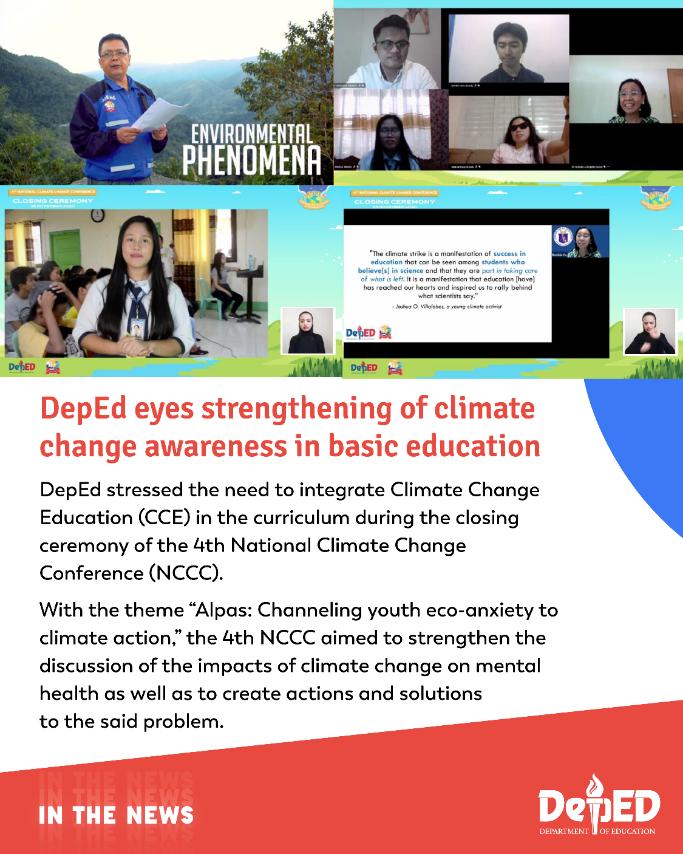 |
PASIG CITY, December 16, 2020 – In an effort to increase climate-literate students and teachers in the country, the Department of Education (DepEd) is aiming to strengthen the integration of Climate Change Education (CCE) in the curriculum.
In a statement during the closing ceremony of the 4th National Climate Change Conference (NCCC), DepEd Disaster Risk Reduction and Management Service (DRRMS) Director Ronilda R. Co stressed that learners should be able to understand the necessary competencies of CCE.
“The overall goal [of this program] is to make the learners and personnel become climate literate and pro-actively leading resilient and sustainable communities. One of the intermediate results is the curriculum integration,” Dir. Co said.
According to Dir. Co, teachers should also have increased competency in CCE, and those competencies should also be strengthened in the media.
Moreover, she noted that schools and offices should also be able to adapt and mitigate climate change through the planned strengthening of CCE integration.
“The intermediate result of this outcome is that policies on mitigation and adaptation are institutionalized. Projects related to climate change adaptation and mitigation are funded,” she also stated.
In addition, Dir. Co also cited that the policies include measuring and decreasing carbon footprint, and increasing adaptation to impacts of climate change both passed and monitored.
School and community-based research, likewise, should also be supported and considered for planning under the adaptation and mitigation of climate change mentioned earlier.
To recall, DepEd has been conducting the NCCC annually since 2017, targeting students and school personnel to be aware of the climate change condition in the country.
With the theme entitled, “Alpas: Channeling youth eco-anxiety to climate action,” the 4th NCCC eyed to strengthen the discussion of the impacts of climate change on mental health as well as to create actions and solutions to the said problem.
This year’s NCCC had been conducted online due to the crisis brought upon by the Coronavirus Disease-2019 (COVID-19), in which Filipino Sign Language Interpretation was provided as well.
“Events like this year’s National Climate Change Conference, along with other initiatives, empower the youth by providing an avenue for learners to openly express their demands for climate action, as well as to propose solutions to growing concerns on climate change,” DepEd Undersecretary Alain Pascua said.
“With consideration to the participants’ knowledge and input, we hope to strengthen existing programs on preparedness, prevention, and mitigation, and response, rehabilitation and recovery in times of calamity. Through the support of our partner agencies and stakeholders, we at DepEd, strive to empower the youth to concur all of life’s challenges,” Undersecretary Pascua added.
Climate Change Threats to Education Sector
“We all know that the Philippines is very vulnerable to disasters. And the fourth country most affected by the disasters, according to Germanwatch 2020,” Dir. Co stated.
Based on the Enhanced Basic Education Information System (EBEIS) School Year 2009-2010 to 2018-2019 data, a total of 43,810 schools had experienced natural hazards at least once.
Director Co also mentioned that a total of 21,949 schools had experienced human-induced hazards at least once within 10 years.
“The impacts of climate change to the education sector are the destruction or damage in infrastructure; schools being used as evacuation centers; loss or inadequacy of basic needs; and the inability of parents to support child’s education due to loss of income brought by the climate impacts to livelihood,” Dir. Co also cited.
“Also, studies show that one of the impacts of climate change is the eco-anxiety and other psychosocial challenges,” she added.
Ongoing Climate-related Programs
As part of enabling the youth through co-curricular activities, Director Co highlighted its existing programs such as the Establishment of Youth for Environment in Schools Organization (YES-O) and the Gulayan sa Paaralan, Solid Waste Management and Tree Planting Under the National Greening Program. (Read Sustainable schools: How Santiago City National HS became one with nature and Blind but not behind: How an impaired student perseveres towards climate change action)
“Co-curricular activities are important because the curriculum is not the only way to deepen the learning [of the students] but as well as the practice in daily life. Learning by doing,” she said.
Dir. Co also emphasized that the agency has launched the Green Beat Initiative, an online environmental journalism training, to strengthen awareness about the impacts of climate change and its solutions.
According to Dir. Co, this environmental journalism training will be further launched in different regions in the country next year. (Read DepEd-DRRMS, AYEJ wrap up first online environmental journalism training for young writers)
Moreover, the DRRMS Director IV also mentioned the Youth Climate Strike, Youth Climate Advocacy Show, and the NCCC as part of enabling the voices and participation of youth. (Read From streets to screens: How youth are bringing activism for climate justice to the digital spaces)
Know more about the other events that happened during the 4th National Climate Change Conference here: https://bit.ly/4thNCCC. (Read DepEd’s 4th National Climate Change Conference goes online)
END
This article was written and prepared by Julianne Marchela Parin (Student-Journalist) and Arlene dela Costa (School Paper Adviser) from Tanza National Comprehensive High School, Division of Cavite who are graduates of DepEd-DRRMS and AYEJ.org’s Green Beat Initiative: An Online Environmental Journalism Training.


